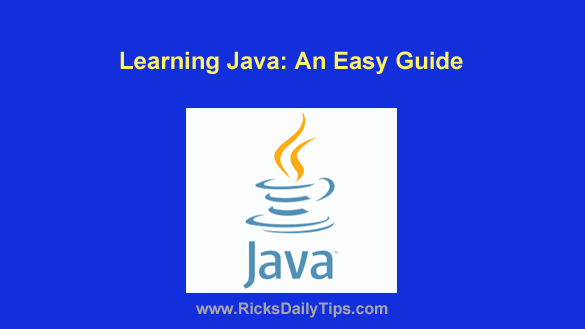 Note: This is a guest post. If you want to guest post on this blog, click here to check out the guidelines.
Note: This is a guest post. If you want to guest post on this blog, click here to check out the guidelines.
In this post IT expert and writer Tom Bezlar offers his tips and recommendations for learning to code in the Java programming language.
Are you finding Java difficult to learn?
Does all the coding give you sleepless nights? Are you eagerly looking for an answer regarding “How to learn Java from scratch“?
Then this is the beginner’s guide you’ve been looking for, specially formulated for you by Codegym, your go-to destination for all things Java-related.
It will take you through a simple description of what Java is and what it entails.
It will also provide an idea of the advantages and disadvantages of learning this highly-used coding language, along with a plan which shares with you the best way to learn Java.
If you want to become one of the top Chicago app developers you will need to master Java, along other similar languages.
What Is Java?
Java, as per any textbook definition, is an object-oriented programming language. It is a combination of the ideas and syntaxes of C and C++ with some other added bits to it.
Java is great for not only games but also for web application development. It was created to provide solutions to almost all the problems faced by programmers and users in the Internet age.
It was developed by James Gosling of the Sun Microsystems and later in 1995 it was made available to the public.
There are a lot of good reasons to learn the Java language.
It’s is a well-known programming language, known for its stability, flexibility, and compatibility with older computer systems.
It can also function on most computers without changing any protocols.
Is Java Really Hard To Learn?
Lots of aspiring programmers wonder of Java a quite difficult to master? The best answer would be that it can be tricky but also very fun.
As a beginner to Java programming, you’ll have some simple ideas of various variables and functions. However, there are also several further abstract, complex concepts such as objects, introducing inheritance, or polymorphism, which might be a bit harder to grasp.
Java is updated on a daily basis, with new features and concepts being added on a regular basis.
- With the different levels of learning the language, there’s a mastery time period, and it gets better if you know the basic ideas of how to learn and practice Java coding.
- If you get the general idea of most of the basic beginner-level concepts and become well versed at early levels of coding, it gets much easier.
Now let’s consider all the advantages and disadvantages of learning the Java programming language.
Here are the Pros for using Java…
- Simple
Java is at its core a simple programming language that’s easy to understand and not very difficult to master.
Its syntax is mainly centered around C++, and it has automatic garbage collection so there is no requirement to erase the unreferenced objects from the memory space.
- Object-Oriented
Java uses an object-oriented pattern, which makes it easier and more practical in use.
All the information in Java are objects which look after both data and behavior.
Java makes use of object-oriented ideas like object, class, inheritance, polymorphism, encapsulation, abstraction, and so on.
- Secured
Java is a safe programming language as it does not make use of Explicit pointers. Also, Java programs function inside a virtual machine sandbox.
- Robust
Java is a strong programming language that makes use of efficient and effective memory management.
- Platform Independent
Java codes can function on multiple platforms in sync without the requirement to compile it over and over again.
If it’s correctly coded, Java runs everywhere. The language (WORA) can be turned into byte code during the compilation.
- Multi-Threaded
Java builds a multi-threaded space where the larger problems can be turned into several different threads and run independently.
And now, the Cons…
- Performance
Java has to be interpreted while at runtime. That means while it runs on multiple operating systems its performance is slower code created with compiled languages like C and C++.
- Memory Usage
Java uses up a lot of storage and memory space since it runs above the Java virtual machine.
- Cost
Really good hardware is needed to run Java programs mainly due to the higher processing and memory needs.
- Less Machine Interactive
Java is awkward when it comes to working directly with machines due to the fact that it doesn’t used Explicit pointers.
What Is the Best Way to Learn Java?
The best way to learn any new coding language is to be patient and master it over time.
The beginner’s guide to learn this coding is to learn the basic syntax of C, C++ before diving into Java.
Always remember that practice really does make perfect, and so, it is with coding.
Here are some platforms where you can practice your Java coding skills in interesting and entertaining ways:
- CodeGym – 1200+ practical tasks are waiting for you on this site. The online validator checks your results once you finish the task so it’s easy for you to see if you are doing any progress.
- CodeChef – This site has a number of amazing challenges. Solve the tasks as presented and you’ll progress with Java quite rapidly.
- Codewars – Become a Java warrior and compete with your fellow developers while upgrading your Java skills.
Final Words
Start learning and mastering the fascinating, yet tricky Java programming language. Put in the effort and you’ll see great progress in no time.
 About the author…
About the author…
Tom Bezlar is a professional writer with a Master’s Degree in Computer Science.
He writes about tools for Java programming, useful sources for learning to code, tech news, and IT trends in general.